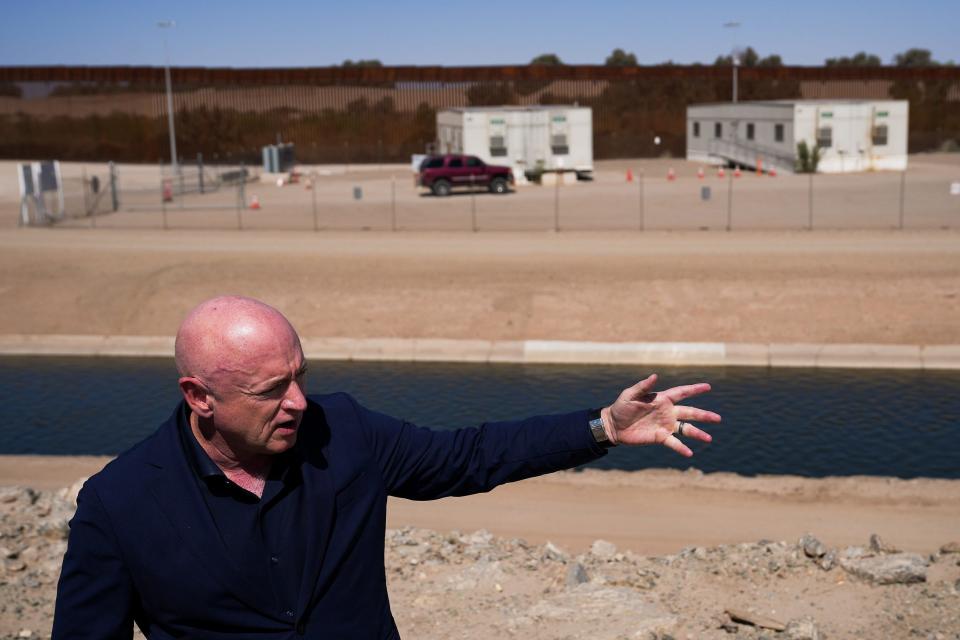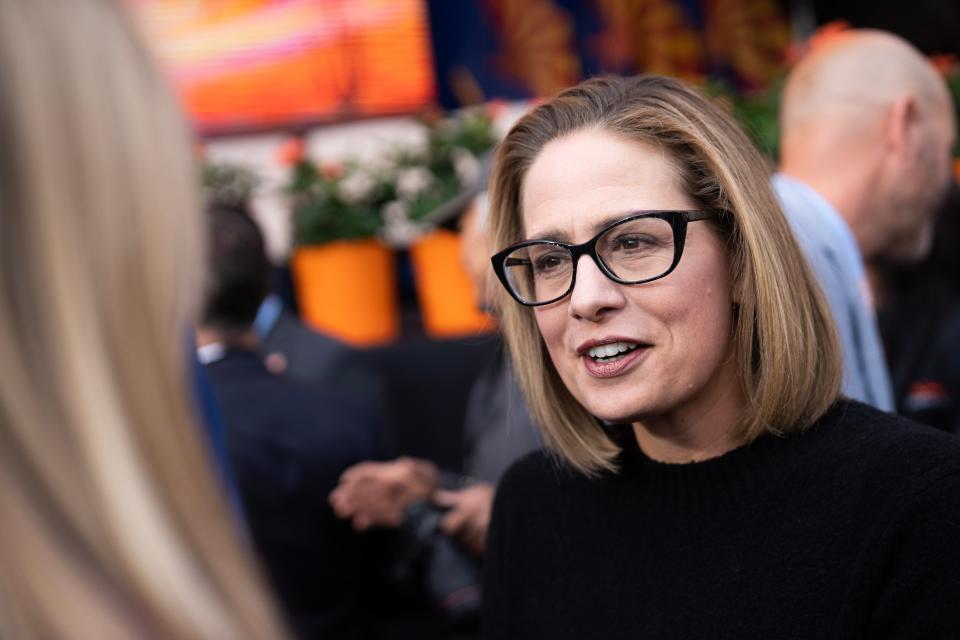Sens. Kyrsten Sinema, Mark Kelly visit border, discuss 'tri-partisan' solutions
- Oops!Something went wrong.Please try again later.
- Oops!Something went wrong.Please try again later.
- Oops!Something went wrong.Please try again later.
SOMERTON — Sens. Kyrsten Sinema and Mark Kelly of Arizona, along with a bipartisan group of senators, met Tuesday with local leaders in Somerton to discuss solutions to the humanitarian, security and economic challenges facing communities along the U.S.-Mexico border.
Sinema, I-Ariz., and Kelly, D-Ariz., held a roundtable discussion with local government and tribal leaders at the Regional Center for Border Health, the humanitarian nonprofit that has spearheaded migrant aid in Yuma County since 2021. Sinema touted the members of the "tri-partisan" delegation as focused on confronting issues and finding solutions.
"You don't often see border tours in a bipartisan manner," Sinema said. "It's usually one party or the other only looking at what they want to look at or complaining about what they want to complain about.
"This is a group of people who all are interested in getting results and solving problems, not just talking to get clicks or on Twitter," she said.
The group included Republicans, Democrats and Sinema, a former Democrat who recently became an independent lawmaker.
During the discussion, local leaders detailed concerns about humanitarian issues, funding, the strain on Border Patrol agents and the possibility of migrant releases into the community. All leaders present called for the federal government to step up and help handle the situation at the southern border.
During the senators’ first stop in El Paso on Monday, Sinema announced she will continue working on the draft immigration reform framework she authored along with Sen. Thom Tillis, R-N.C., who also was present at the roundtable discussion.
The last-minute proposal would have given 2 million undocumented youth, known as "Dreamers," a path to citizenship while extending the Trump-era Title 42 border restriction for another year. The bipartisan framework failed to win enough support in the Senate before Congress adjourned in December.
Title 42 was set to end Dec. 21 but its future now rests with the U.S. Supreme Court until a decision is handed down, which could come in early summer.
The senators' visit comes during the same week that the Border Patrol is to begin construction on four gaps along the border wall near the Morelos Dam near Yuma. The Yuma-area border wall gaps are projected to be closed with temporary mesh fencing and mechanized bollard vehicle gates by summer 2023, according to U.S. Customs and Border Protection.
Footing the bill: Doug Ducey's shipping container barrier will cost AZ taxpayers over $200M
The gaps recently were left bare after former Arizona Gov. Doug Ducey, a Republican, ordered the double-stacked shipping container barrier torn down after a lawsuit from the Biden administration. Ducey ordered the shipping container barrier built in August, two days after Kelly’s most recent previous visit to Yuma when he toured the area to tout his efforts in helping to close the gaps.
Ducey’s August announcement also came about two weeks after Homeland Security Secretary Alejandro Mayorkas authorized CBP to fill the gaps in the border wall near the Morelos Dam.
Ducey’s five-month shipping container project near Yuma cost Arizona taxpayers more than $22 million, according to state contracts. The entire effort cost taxpayers more than $200 million.
"I understand (Ducey's) frustration," Kelly said. "At the same time, I'm an engineer. Stuff like this should be engineered well. It should be able to last and it should be planned."

Kelly added that he's in favor of having the Border Patrol recommend to CBP and the Department of Homeland Security where barriers are needed, and where they are not.
"Barriers make sense in a lot of places; in other places, they don't make any sense," Kelly said.
Cocopah Indian Tribe Chair Sherry Cordova detailed cultural concerns during the discussion that she has heard from members of her community regarding the shipping containers that were put in the Cocopah community near Yuma. The containers blocked community members from visiting the Colorado River and practicing traditional customs, Cordova said.
Cordova acknowledged the need for immigration reform and to secure communities, but underscored the taxing effect that the containers have had on her community and its elders.
"For us, it was pretty bad," Cordova said in regard to the container barrier. "To not be able to go down there and do the things that we've done in the past, it affects our membership."
Prior to the meeting, the six-senator delegation toured the gaps near the Morelos Dam and the area where the border wall ends at the start of the Cocopah community. This area has become a frequent crossing point for migrants to present themselves to Border Patrol agents and then request asylum.
Agents see about 800 to 1,000 people arrive daily in the area.
President Biden to El Paso: 'What can I do to help?'
The senators’ visit to the Arizona-Mexico border comes a couple of days after President Joe Biden’s first visit to the southern border in El Paso. Biden stopped there on Sunday before heading to Mexico City for the North American Leaders’ Summit, where he is meeting with Mexican President Andrés Manuel López Obrador and Canadian Prime Minister Justin Trudeau.

Besides Tillis, Sens. John Cornyn, R-Texas; James Lankford, R-Okla.; and Chris Murphy, D-Conn., joined Sinema and Kelly on their visit to the U.S.-Mexico border.
Sens. Jerry Moran, R-Kan., and Chris Coons, D-Del., also were part of the delegation but could not attend the discussion.
Amanda Aguirre, CEO of the Regional Center for Border Health, Yuma County Sheriff Leon Wilmot and government leaders from Yuma, San Luis and Somerton attended the discussion.
Border visit comes as Title 42's future remains uncertain

Sinema first teased the bipartisan delegation visit during a Dec. 20 Senate floor speech, one day before the pandemic-era Title 42 border restriction was set to expire.
“When we come back to Congress in January, one of the first things I’ll do, with Senator Tillis, is convene a bipartisan group of senators who are willing and committed to get something done,” Sinema said during her remarks.
“We’re going to bring them to the border. We’re going to see what Arizonans see every single day because a crisis this big should not and cannot be ignored.”
Immigration efforts: Sinema, Kelly commit to seek reform as clock runs out on Congress
Sinema’s speech came days after her immigration reform framework failed to garner enough support. The bipartisan draft aimed to please lawmakers on both sides of the aisle, extending a controversial border restriction while also providing a path to citizenship for millions of undocumented people.
Arizona advocates applauded the initiative to help "Dreamers" but criticized the proposal for extending Title 42.
The proposal also included at least $25 billion in increased funding for the Border Patrol and border security alongside a significant boost in resources to facilitate the processing of asylum seekers with new processing centers, asylum officers and judges.
Sinema subsequently proposed a multibillion-dollar amendment during a lame-duck debate over the Senate’s $1.7 trillion spending package. The amendment, which fell short of the required votes, aimed to extend Title 42 until a proper plan is in place and surge resources to the border.
Title 42 continues in effect after the Supreme Court blocked the Biden administration from lifting the health policy. The restriction was first invoked under the Trump administration in March 2020 and has been used to rapidly expel migrants at the nation’s borders more than 2 million times.
Community readiness: As Title 42 policy winds down, leaders on border detail preparations
Marco Antonio “Tony” Reyes, chairperson of the Yuma County Board of Supervisors, was scheduled to attend the discussion but did not. Reyes on Dec. 14 declared an emergency in unincorporated areas of Yuma County in preparation for the expected rise in migrant encounters at the border alongside a “triple threat” of COVID-19, respiratory syncytial virus and influenza as the reasoning for his declaration.
The next day, San Luis Mayor Nieves Riedel proclaimed a local emergency because of the health and humanitarian crisis along the Arizona-Mexico border.
Have a news tip or story idea about the border and its communities? Contact the reporter at josecastaneda@arizonarepublic.com or connect with him on Twitter @joseicastaneda.
This article originally appeared on Arizona Republic: Sinema, Kelly visit Somerton to discuss solutions with local leaders

